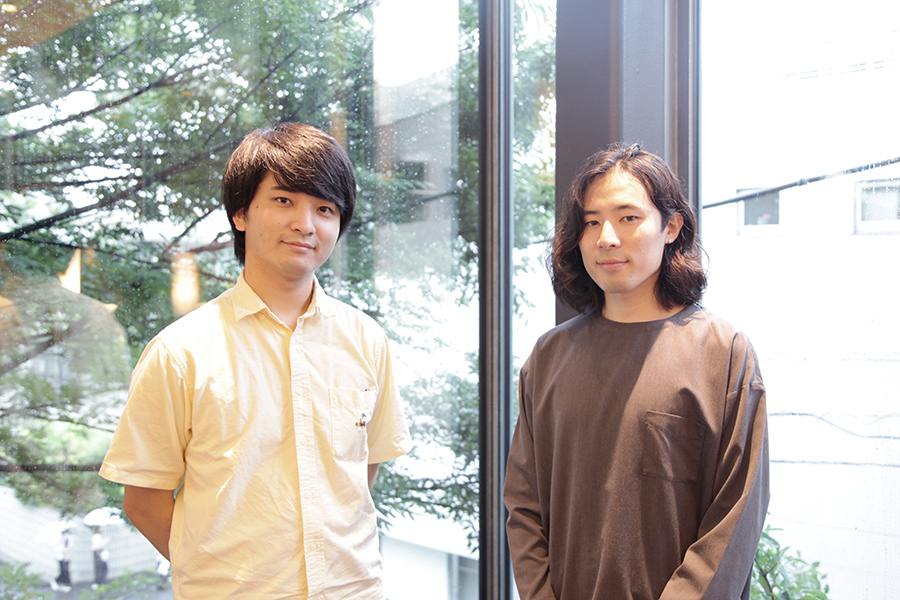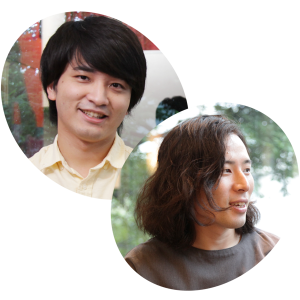新しい発想や視点で社会を良い方向に導くクリエイティブアクションを表彰する『NOVUS FUTURE DESIGN AWARD』。例年SOCIAL INNOVATION WEEKのなかでキックオフされ、受賞プロジェクトは渋谷を舞台に社会実装を目指すという実践型のコンペティションです。2021年度のグランプリ「画のないグルメガイド」プロジェクトの北浦さんと大川さんをお招きし、いよいよ同プロジェクトのローンチが迫るなか、お話を聞きました。
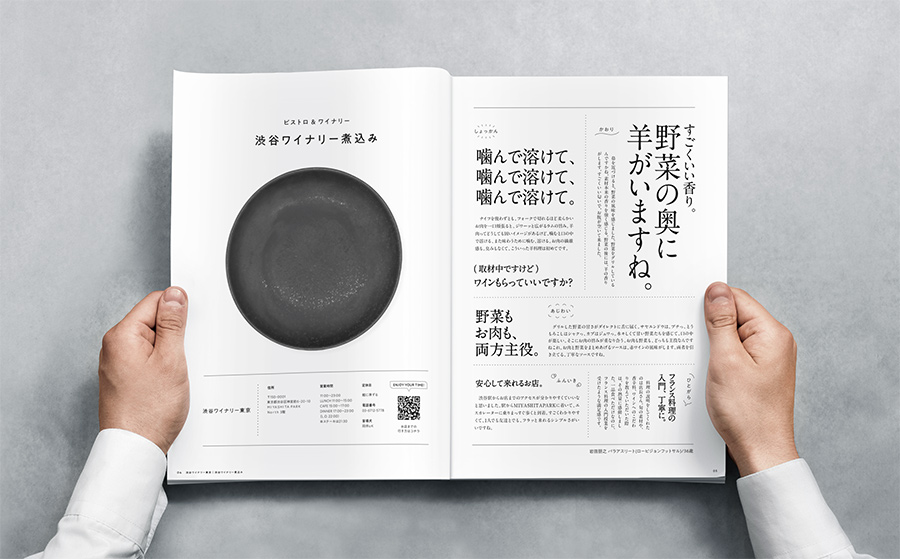
視覚障がい者の方の「ひとこと」が心に刺さった
——まずは「画のないグルメガイド」プロジェクトの概要をあらためておしえてください。
北浦 「画のないグルメガイド」は、一言でいうと、視覚障がい者の方ならではの感受性をお借りして表現していこうというグルメガイドです。
見た目だけじゃなくて、その奥に潜む料理の魅力、例えばおいしさだったり、香りだったり、食感だったり、もしかしたら料理を作ったり運んでくれる店員さん、お店自体から感じた雰囲気までが表現されることを目指しています。

——このアワードへの応募はどんな経緯で?
北浦 僕と大川は、本職ではそれぞれ異なる広告代理店で、企画プランナーをしているのですが、これまでも一緒にいろんなアイデアコンペに応募してきました。そのなかで、企画が評価されるのは嬉しいけれど、実現しない企画をつくり続けることにちょっと疑問を抱いたことがあったんですね。そんななか『NOVUS FUTURE DESIGN AWARD』の受賞企画には、渋谷区という、アイデアを実装するフィールドが用意されていることに大きな期待をもって応募しました。
大川 今回の企画は、実は別のコンペのときに原型となるものはできていたんです。そのコンペでは受賞できなかったんですが、そもそもこの企画は「賞を取りたい」という気持ちよりも「実現させたい」という思いが強いものでした。そこで、「この原石をもう1回磨いて出してみないか?」と北浦に誘ってもらって『NOVUS FUTURE DESIGN AWARD』に応募したんです。
——実現したいという強い思いを抱くきっかけはなにかあったんですか?
北浦 企画を考えているときに、実際に視覚障がいをもつ方が集う協会さんへいきなりドアノックして行って、途中段階の企画を見てもらったんです。そのときに皆さんと食事に行ったりもして、目の見えない方々がこの企画を喜んでくれたし、彼らから出てくる言葉もユニークで、これは本当にいいものができるかも、と思えるようになりました。
大川 あとこれはアワードの受賞後の話ですが、レーベル病を患い視覚障がいを後天的にお持ちになった岩田朋之さんという方を、渋谷未来デザインさんに紹介していただいたんです。このプロジェクトでは結果的にこの岩田さんに、いろんな視覚障がい者の方々のアサインなど、本当にお世話になったんですが。一番最初に岩田さんご夫妻と会食をして、その帰り道にね…?
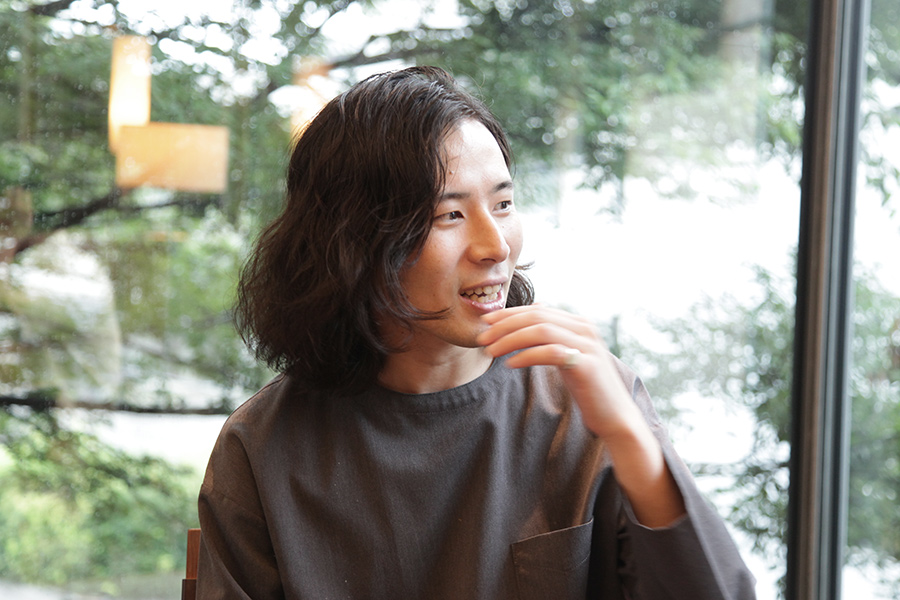
北浦 そう。渋谷で食事をした帰りの夜道で、岩田さんは渋谷出身の方なんですけど、「久々に渋谷に来たなぁ」って言うんです。「渋谷出身なのに、あんまり来ないんですか?」と聞くと、渋谷は見えないことをすごく実感する街だとおっしゃるんですね。街頭にはいろんな広告があって、建物もどんどん新しくなって、人も多くて、でもそれが全部分からない、と。自分が生まれた場所だけど、なかなか向き合えない自分がいるんだと語ってくれたんですが、そのとき岩田さんは、スクランブルスクエアの上あたりを見上げて、「目が見えなくなって10年経ったけど、今日が一番渋谷がきれいに見えます」って。
「僕は、見えない人たちの社会的立場をどうやってアップデートできるかっていうことを10年間考えてきて、それでもわからないままモヤモヤしてたんですけど、今日おふたりの企画の話を聞いて、うれしかった」と。だから今日は渋谷がきれいに見える、っていう言葉を聞いて、僕はもう涙目で(笑)。こんな言葉をかけてもらえるぐらい期待してくれていることを感じて、すごくうれしかったですね。
大川 「これはもうやるしかない」ってね。
想像が及んでいなかった感覚、<ふんいき>と<ひとがら>
——そんな「画のないグルメガイド」は今、このインタビューの時点では、掲載店舗の取材はひと通り終わったところ。取材していく中であらためて気づいたことはありましたか?
北浦 もともとコンペに応募したときの内容では、<あじ>と<かおり>と<しょっかん>という3つのタームに分けてつくろうと思っていたんです、やっぱり料理の話をしたいから。でも実際に、見えない方たちと一緒にお店に行くと、みなさん空間や環境に対しての感覚がすごくて、「このお店、坂がこうだから来やすいですね」とか。
——お店にたどり着くまでのところから。
北浦 その後も、店内の音楽の心地よさとか、テーブルの手触りとか。そのお店で過ごす時間をとても濃く楽しんでいるんだなっていうことに気づきました。
あとは、メニューが読めないので、頼むときにどうしても店員さんとの会話が生まれます。オススメを聞いたりするなかで、店員さんの人柄とか、彼らの料理への思いなんかも感じ取っているので、項目に<ふんいき>と<ひとがら>というふたつを足したんです。これは自分たちの想像だけではたぶんたどり着けなかったことだと思います。
——それは読者にとっても、グルメガイドとしては斬新なポイントですね。
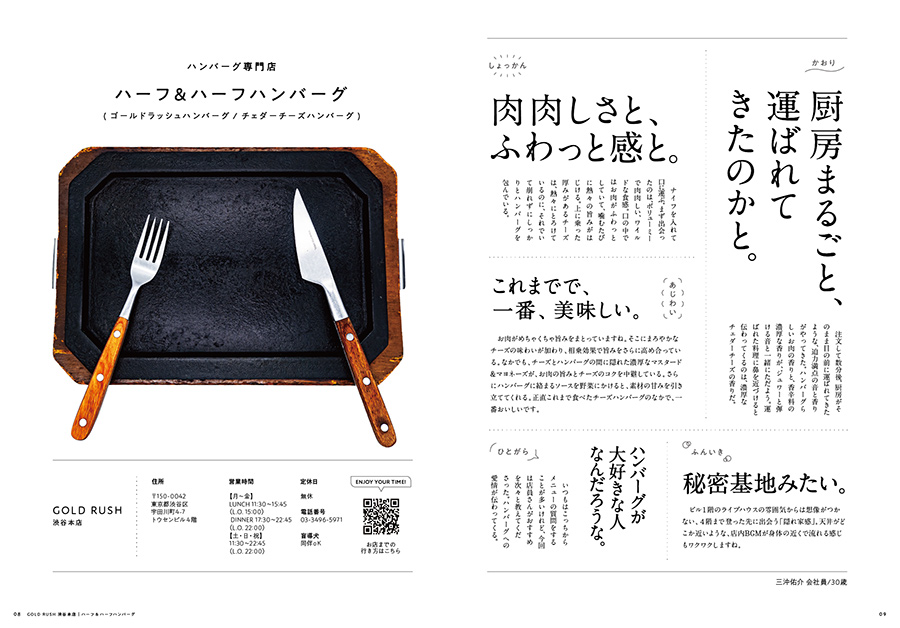
北浦 コンセプトのおもしろさだけじゃなくて、グルメガイドとして、読み物として、ちゃんとおもしろい、役に立つと思ってもらえることには特にこだわりました。
大川 レポーターの方も多様で、ちっちゃい小学生の子から上は55歳ぐらいの方で、男女もばらばら。見えるレベルも少しずつ違ったりします。例えば小学生の子がレポートしてくれているページだと見出しが、「目の前にマンゴー!」とか。
北浦 「エベレストみたい!」とかね。
——まさに人柄が出てますね。そんな冊子が、いつどこで手に入れられるようになるんですか?
北浦 10月の第2木曜日が「世界視力デー」で、今年は10月13日なので、そこでローンチ予定です。配布場所は、渋谷駅地下1階コンコースにある「WANDER COMPASS SHIBUYA 」や、渋谷フクラスにある観光案内所兼アートセンター 「shibuya-san」など。ほかにどこに置いていただけるか、調整中です。
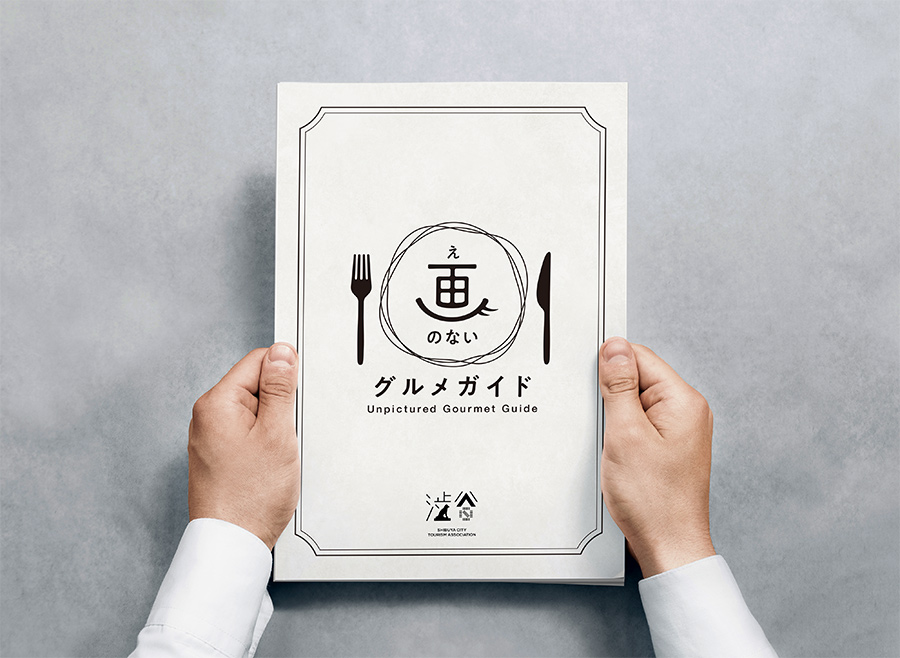
自分の街を好きだと言えるように、渋谷から広がってほしい
——最後に、おふたりは渋谷という街に対してどんな思いを持っていますか?
北浦 今回あらためて思ったのは、やっぱり渋谷はいろんなことに対する理解が進んでいて素敵だなということです。僕たちのプロジェクトに対してこんなにサポートしてくれるということもすごいなと思っています。一方で、渋谷区以外の自治体も、それに続いて動いていってくれたらいいなと思います。
例えば、渋谷区が日本で最初に採用した「パートナーシップ制度」も、今では日本各地で採用されはじめています。渋谷区の素晴らしさに牽引されて、他の地域の動きも更に加速していくとうれしいですね。
大川 実は「画のないグルメガイド」ともうひとつ、北浦と一緒に今回応募した「一人ひとりの出生届」という企画ではPublic Design賞をいただきました。
この出生届は、普通の出生届とは記入欄がひとつだけ違っていて、性別欄で通常は生まれた時の生物学的性別として「男」か「女」を選ぶんですが、そのとなりに「この子らしい性で生きていけますように」というチェック欄をつくりました。
北浦 生の数だけ性がある、という考えを浸透させることで、ちょっと背中を押してあげられる人がいるんじゃないかなと思いました。既存の仕組みにプラスアルファ、渋谷区らしい足し算ができないかなと思ったのがきっかけです。
大川 まさにこういうのも、日本で一番最初にやるならまず渋谷区だよね、っていう感覚が僕らの中にあるし、そうやって「渋谷区っていいよね」と思える人が増えている自治体って強いなと思うんです。自分の帰属意識というか、自分の住んでいる場所が好きと言える自治体がもっともっと増えればいいなと思いますし、それこそ渋谷区をモデルにして、地方都市の活性化にもつながっていくといいなと思いますね。
